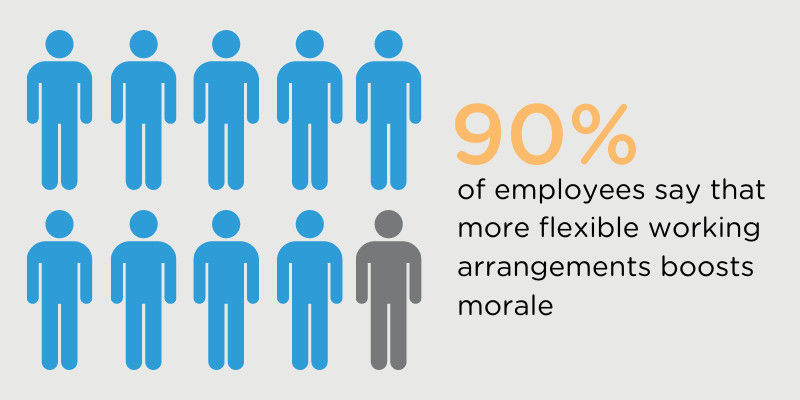
By
Tomás Battaglia
April 5, 2022
Updated
September 9, 2025
Remote work is becoming a permanent fixture in the new normal.
And businesses know it. A report by Owl Labs revealed that 56% of companies have either gone hybrid or fully remote since the pandemic.
While a survey by FlexJobs revealed that 75% of people prefer to work remotely to reduce distractions, another survey by Upwork has found that 73% of all departments in a company will have remote workers by 2028.
Major companies such as Salesforce, Spotify and Microsoft have also publicly spoken about their efforts to embrace a remote or flexible post-pandemic workplace.
A Gartner survey revealed that 74% of CFOs have decided to implement remote working as a permanent possibility. Even Mark Zuckerberg has expressed that remote is the way to go. Sharing his plans to have at least 50% of Facebook employees work remotely in the next five to 10 years.
Workers are just as, if not more enthusiastic about the prospect of remote working. 95% of respondents to the FlexJobs survey have reported higher levels of productivity on a remote arrangement. In what is perhaps the most powerful statistic in support of teleworking, Buffer’s 2021 State of Remote Work found that 97.6% of its participants would choose to work remotely for the rest of their careers.
Is a remote workforce effective?
While Covid-19 may have accelerated the adoption of remote work policies, the rise in its acceptance has been gaining momentum in the last few years. From happier, more productive employees and more collaborative environments, to creating a more positive environmental impact, remote work's effectiveness is consistently displayed.
Research found that employees with greater job flexibility were more engaged and enthusiastic about their performance. This can be proven in a study conducted on China’s largest travel company
Volunteers who were required to work from home four days a week for nine months showed major improvements in performance. Resignations dropped by 50%. Findings also showed that those who worked from home could properly utilise their full shift due to increased concentration.
In the US, Airtasker conducted a survey to understand workplace habits and productivity. They recorded similar results. Remote workers were more productive than their in-office counterparts. Work-life balance improved, and they had better wellness scores. The following shows some of the most compelling findings:
- Remote employees worked 16.8 more days per year compared to their in-office colleagues.
- In-office employees were unproductive for an average of 37 minutes. Remote employees were unproductive for only 27 minutes.
- Remote employees were healthier in terms of exercise. Clocking in 25 more minutes of physical activity than in-office employees.
- Remote employees take longer breaks on average than office employees. But they work an additional 10 minutes a day.
- 15% of remote employees admitted to being distracted by their manager compared to 22% of in-office employees.
- 39% of remote employees found ways to avoid working compared to 56% of in-office employees.
With remote work on the rise, business leaders are paying more attention to how they can create positive experiences amidst a dispersed workforce
Remote working is not without its challenges, and one of the most complex ones involves keeping remote employees engaged.
More and more companies are realising that employee engagement goes hand-in-hand with employee well-being. According to Deloitte’s 2020 Human Capital Trends report, organisations that place well-being at the forefront of their work culture are the ones most likely to see upticks in productivity and performance.
To assist this experience on both the employee and employer front is where an Employer of Record (EOR) rises to the occasion.
Onboarding

Source: Shutterstock
A primary goal of employee onboarding is to help new employees acclimate to their new roles and company philosophies. This involves ensuring they have the necessary tools to settle in and begin their new role.
The onboarding process often involves introducing new employees to their team members and key stakeholders in the company, facilitating training on company policies and culture, providing them with access to the resources they’ll need to perform, and much more.
For remote employees, businesses must be especially sensitive to the fact that a virtual onboarding experience can fall short on several core components that make up an in-person onboarding experience. Therefore, it is vital to develop an onboarding strategy that takes these gaps into account and supports a new remote hire.
Facilitating the communication between the new employee and the team could shape the newcomer's impression and productivity. A full-service EOR partner will be able to help you manage your remote employee onboarding procedure and ensure that your new hire has access to all the resources they need from their first day and can communicate about any potential challenges with their team.
Provide Learning & Development Programs
It is often daunting to work at a new establishment. Even more so when it is remote, as employees may feel distanced from their team in regard to learning new skills needed in the role. For most organisations, this burden lies on the company, but with an Employer of Record present, it can be greatly lightened.
While allowing the company to focus on its growth, an established EOR takes over the duty of facilitating employee growth and progression through a catalogue of available services.
.png?width=800&name=L%26D%20Mind%20Map%20(1).png)
Learning Management System
A learning management system (LMS) is an automated training platform with huge flexibility. It can be designed for specific goals, such as product knowledge training, upskilling courses and compliance exercises. It can also serve as an orientation program for new employees to ease their transition into the company.
With an automated training program, employers need not spend extra time and resources knowing that the employees are on a good growth plan.
Content Creation
An EOR uses its extensive knowledge and understanding of the climate to create effective training content. By tailoring content to the client's specifications, an Employer of Record can create accurate and engaging content that hits each learning objective on the mark, allowing the client to entrust the learning process to the EOR to adapt as the company progresses.
Leadership Development Programs
Promoting internal professional development is a great way to empower employees. To do so, talented employees require appropriate training to groom them into a high-calibre leadership role.
Companies can work with their EOR partners to identify this talent and apply innovative techniques to cultivate valuable leadership qualities in them, including communication, negotiation, problem-solving, and people management skills.
Help HR create new policies that are unique to remote work conditions
Remote work isn’t a new concept, but it has been forced onto the workforce since the COVID-19 pandemic. In regards to this, a company has to adapt to the conditions and establish new policies that work well with its direction while also ensuring that the employees' needs are met. Formulating these policies is where an EOR comes into the picture.
An EOR, being well versed in the inner workings and laws of the inhabited country, alleviates the burden of the client needing to spend time and resources doing so. Establishing new policies catered to respective organisations and countries helps reduce compliance risk, boost employee value, offer clarity and allow for remote work scalability.
An EOR understands the tax and risk factors of the climate and can help reduce unnecessary legal risks to the company. On the other hand, employees feel comforted that they are not on the losing end of working remotely and have a clear line of sight of their new working conditions, including training, pay, tax and office hours.
Having clear remote working policies in place allows for the company to grow their remote workforce substantially with minimal setbacks.
Support remote workers with the right tools and practices

Source: Shutterstock
Remote workers are expected to perform just as effectively as physical workers and to do so, they require the appropriate tools to perform tasks and communicate with their team accordingly.
The vast amount of virtual work tools at our disposal today makes it difficult for an employer to decide on the most effective ones and merge them into day-to-day operations.
An EOR takes on this duty by staying updated on the available communication tools and those that suit the company's operations best. They can provide the tools needed and support the employees with the transition to using them with as minimal obstruction to operations as possible.
Offboarding
Offboarding employees can be a difficult and, sometimes, uncomfortable process that all companies must endure. How a company handles the offboarding process can reflect back on the practices of the company and affect its reputation amongst potential candidates.
Many HR leaders will agree that when it comes to handling employee termination, resignations, or layoffs, in-person conversations are the preferred method. However, the rise in remote and global employees means this approach is not always feasible.
Some global mobility firms provide virtual outplacement services as part of their EOR solutions line to help ease remote employees into the transition and prepare them to re-enter the job market.
During the career transition process, the outplacement provider will work with employees to help them develop resumes, discover potential job leads, and perform career assessments and salary benchmarking.
This service can be provided as early as when an employee receives notice of separation. For the employer, it minimises the negative impact of an uncomfortable separation and helps to protect their reputation.
Virtual outplacement democratises the service by ensuring it's made available to all employees within an organisation, regardless of where they live or work. It also saves time and money by allowing a transitioning employee to schedule sessions with the outplacement service provider according to a timeline that suits them
This case study from Airswift illustrates the structured assistance an EOR can provide for offboarding on a large scale. In this case, 40 personnel were to be retrenched, and Airswift crafted an Outplacement Program that handled data gathering, individual consultations and an eight-week period of support to identify and secure future employment.
Remote workplace trends of 2022 and beyond
Source:elenabsl/Shutterstock
From technological advancements to the rise in value for more holistic work environments, we look at some of the transformational shifts we can expect to see in the future.
Teleconferencing software like Zoom and Google Meets have paved the way for businesses to thrive in remote environments. According to Fast Company, remote work software will become the preferred method for all communication. Replacing even face-to-face meetings. Salesforce’s acquisition of Slack is an example of the demand for collaborative tools that allow people to work remotely.
Our understanding of the office space will also begin to change. The Kung Group predicts that physical office spaces will be utilised differently. Mostly as an arena for “important meetings that optimise alignment, innovation, and work relationship building.
Additionally, company culture will matter more than ever. With the loss of physical interactions, companies will need to take steps to build trust and relationships across all levels of employees. It will require commitment and communication that extends far beyond weekly team lunches.
Management must focus on implementing initiatives that connect employees with one another, keep them informed and foster inclusion. Companies must also provide employees access to the information they need to perform well.
Remote working will cause a redistribution of talent away from major cities and business hubs. People will have more say in where they choose to live based on the quality of life they want, without it coming at the expense of their career goals.
Recruitment will no longer be limited by geographical constraints. This will set the tone for remote teams to become a core strategy in global companies. Companies can make hiring calls based almost exclusively on talent instead of the location. Creating a global, more democratised talent pool of professionals.
In response to this trend, global employment solutions will play a vital role in mobilising international employees and streamlining the various processes.
Improve your employee management with Airswift
Going remote with your employees is the way forward, but it need not be a burden and cost to your operations. An Employer of Record can help you hire international talent and manage various aspects of employment including payroll, taxes, onboarding and employee benefits administration.
We're currently established in over 60 countries and have worked with businesses around the world to customise solutions to help expand their remote workforce with seamless operational transition.
Get in touch with us today so we can support your growth and goals with our expert solutions.

